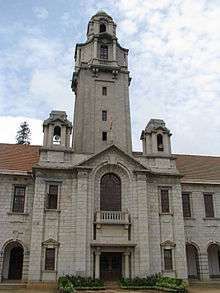H. R. Krishnamurthy
Hulikal Ramaiengar Krishnamurthy (born 1951) is an Indian theoretical physicist. He specializes in theoretical condensed matter physics, especially quantum many-body theory and statistical physics.[1] He was the chairman of the Department of Physics, Indian Institute of Science.[2] He is one of the research scholars who worked under Prof. Kenneth G. Wilson. His main work was titled Renormalization Group Approach to the Anderson Model of Dilute Magnetic Alloys.[3]
Prof. H. R. Krishnamurthy | |
|---|---|
| Born | 1951 |
| Nationality | Indian |
| Citizenship | India |
| Alma mater | Cornell University |
| Known for | Numerical Renormalization Group, Anderson Impurity Model, High Tc Superconductors, Superfluidity, Ultracold Quantum Gases, Optical Lattices |
| Awards |
|
| Scientific career | |
| Fields | |
| Institutions | |
| Doctoral advisor | Kenneth G. Wilson, John W. Wilkins |
| Doctoral students | Madan Rao, Pinaki Majumdar, Tathagat Avatar Tulsi |
| Website | http://www.physics.iisc.ac.in/~hrkrish/ |
Biography

Krishnamurthy obtained his BSc (Hons) in Physics (1970) from Bangalore University and MSc (Physics) (1972) from IIT, Kanpur. He studied in Cornell University (1972–76) as IBM fellow, working with Kenneth G. Wilson and John W. Wilkins. In his PhD thesis, he extended Wilson's numerical renormalization group solution for the Kondo problem to the symmetric Anderson impurity model.[4] The extension to the asymmetric case was completed during his post-doctoral tenure (1976–78) at the University of Illinois. Krishnamurthy returned to India and joined the Department of Physics, IISc, Bangalore (1978) and became a Professor (1996). He has held sabbatical positions at Princeton University, Harvard University, Ohio State University, University of Cincinnati, UC Davis and Georgetown University.
References
- "H. R. Krishnamurthy Elected Fellow of TWAS". International Centre for Theoretical Sciences. 28 November 2011. Retrieved 29 June 2018.
- Faculty: Department of Physics. Indian Institute of Science. Retrieved 29 July 2013.
- Publications: H. R. Krishnamurthy. Indian Institute of Science. Retrieved 29 July 2013.
- Krishnamurthy, H. R.; Wilkins, J. W.; Wilson, K. G. (1 February 1980). "Renormalization-group approach to the Anderson model of dilute magnetic alloys. I. Static properties for the symmetric case". Physical Review B. 21 (1003). doi:10.1103/PhysRevB.21.1003. Retrieved 13 May 2018.